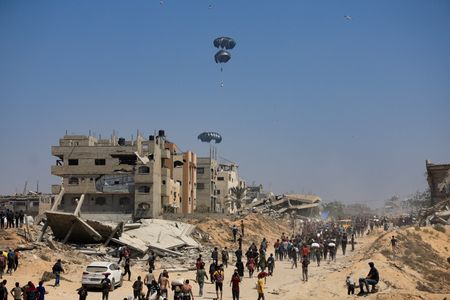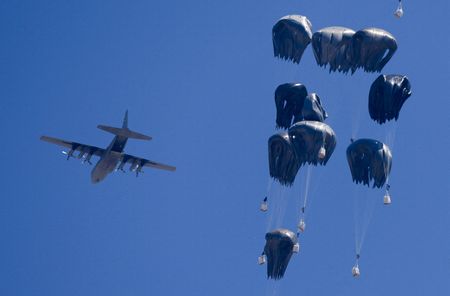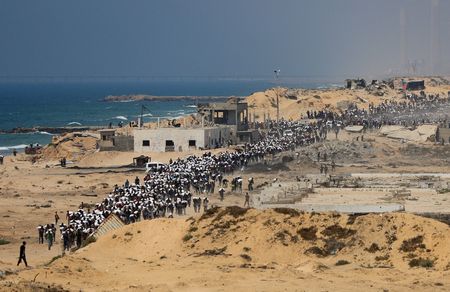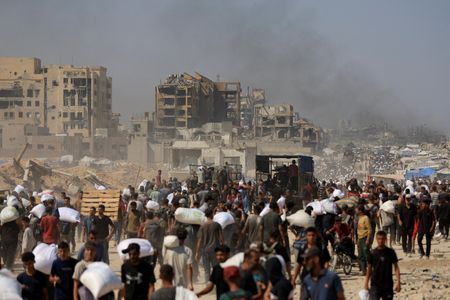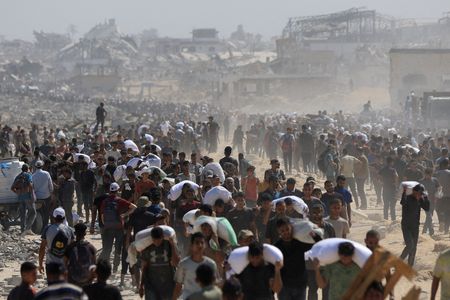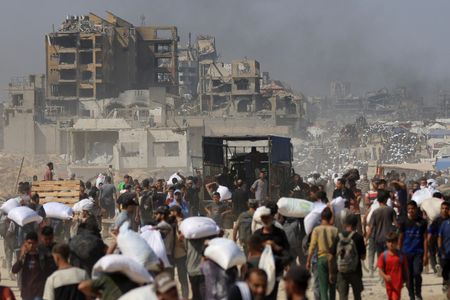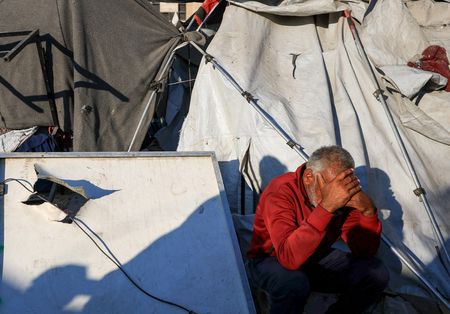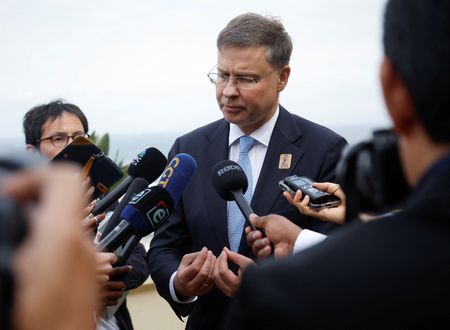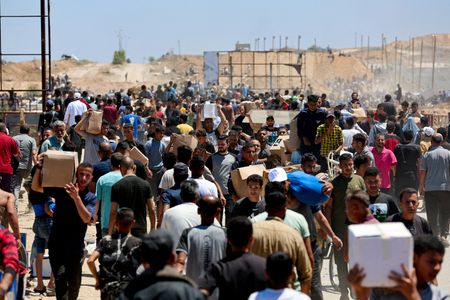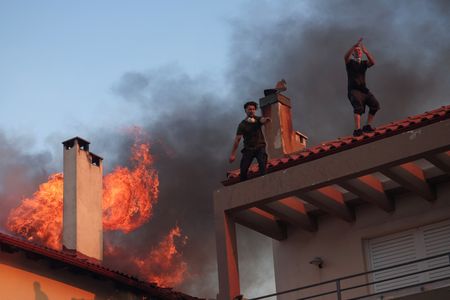By Nidal al-Mughrabi and Charlotte Greenfield
JERUSALEM/GAZA (Reuters) -Israel said on Sunday it would halt military operations for 10 hours a day in parts of Gaza and allow new aid corridors as Jordan and the United Arab Emirates airdropped supplies into the enclave, where images of starving Palestinians have alarmed the world.
Israel has been facing growing international criticism, which the government rejects, over the humanitarian crisis in Gaza and indirect ceasefire talks in Doha between Israel and the Palestinian militant group Hamas have broken off with no deal in sight.
Military activity will stop from 10 a.m. to 8 p.m. (0700-1700 GMT) until further notice in Al-Mawasi, a designated humanitarian area along the coast, in central Deir al-Balah and in Gaza City, to the north.
Jordan and the United Arab Emirates parachuted 25 tons of aid into the Gaza Strip on Sunday in their first airdrop in months, a Jordanian official source said.
The official said the air drops were not a substitute for delivery by land.
Palestinian health officials in Gaza City said at least 10 people were injured by falling aid boxes.
The military said designated secure routes for convoys delivering food and medicine will also be in place between 6 a.m. and 11 p.m. starting from Sunday.
U.N. aid chief Tom Fletcher said staff would step up efforts to feed the hungry during the pauses in the designated areas.
“Our teams on the ground … will do all we can to reach as many starving people as we can in this window,” he said on X.
Health officials at Al-Awda and Al-Aqsa Hospitals in the central Gaza Strip said Israeli firing killed at least 17 people and wounded 50 waiting for aid trucks on Sunday. Israel’s military did not immediately respond to a request for comment.
Dozens of Gazans have died of malnutrition in recent weeks, according to the Gaza Health Ministry in the Hamas-run enclave.
The ministry reported six new deaths over the past 24 hours due to malnutrition, bringing the total deaths from malnutrition and hunger to 133 including 87 children.
On Saturday, a five-month-old baby, Zainab Abu Haleeb, died of malnutrition at Nasser Hospital in Khan Younis, health workers said.
“Three months inside the hospital and this is what I get in return, that she is dead,” said her mother, Israa Abu Haleeb, standing next to the baby’s father as he held their daughter’s body wrapped in a white shroud.
The Egyptian Red Crescent said it was sending more than 100 trucks carrying over 1,200 metric tons of food to southern Gaza on Sunday.
A Palestinian official source said on Sunday afternoon that trucks were still being inspected at Kerem Shalom and had not yet entered Gaza.
Aid groups said last week there was mass hunger among Gaza’s 2.2 million people and international alarm over the humanitarian situation has increased, driving French President Emmanuel Macron’s decision to recognise a Palestinian state in September.
A group of 25 states including Britain, France and Canada last week condemned the “drip feeding of aid” and said Israel’s denial of essential humanitarian aid was unacceptable.
Israel, which cut off aid to Gaza from the start of March and reopened it with new restrictions in May, says it is committed to allowing in aid but must control it to prevent it from being diverted by militants.
It says it has let enough food into Gaza during the war and blames Hamas for the suffering of Gaza’s people.
Israel and the U.S. appeared on Friday to abandon ceasefire negotiations with Hamas, saying the militants did not want a deal.
HOPE, UNCERTAINTY
Many Gazans expressed some relief at Sunday’s announcement, but said fighting must end permanently.
“People are happy that large amounts of food aid will come into Gaza,” said Tamer Al-Burai, a business owner. “We hope today marks a first step in ending this war that burned everything up.”
Prime Minister Benjamin Netanyahu said Israel would continue to allow the entry of humanitarian supplies whatever path it took, and it was making progress on both fighting and negotiations.
“We will continue to fight, we will continue to act until we achieve all of our war goals – until complete victory,” he said.
Hamas denounced the Israeli measures to allow more aid into Gaza, saying Israel was continuing its military offensive.
“What is happening isn’t a humanitarian truce,” said Hamas official Ali Baraka in a statement on Sunday.
Israel’s far-right National Security Minister Itamar Ben-Gvir said the aid decision was made without his involvement. He called it a capitulation to Hamas’ deceitful campaign and repeated his call to choke off all aid to Gaza, conquer the territory and encourage Palestinians to leave.
A spokesperson for Netanyahu did not immediately respond to a question about Ben-Gvir’s comments.
The war began on October 7, 2023, when Hamas-led fighters stormed southern Israel, killing 1,200 people, mostly civilians, and taking 251 hostages back to Gaza, according to Israeli tallies.
Since then, Israel’s offensive has killed nearly 60,000 people in Gaza, mostly civilians, according to Gaza health officials, reduced much of the enclave to ruins and displaced nearly the entire population.
(Reporting by Nidal al-Mughrabi, Charlotte Greenfield, Dawoud Abu Alkas, Jaidaa Taha and Mayaan Lubell; Editing by Kate Mayberry, William Mallard, Helen Popper, Alexandra Hudson and Giles Elgood)

